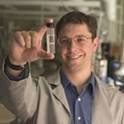
Pyrolysis oils are the cheapest liquid fuel derived from lignocellulosic biomass. However, pyrolysis oils are a very poor quality liquid fuel that cannot be used in conventional diesel and internal combustion engines. In this paper we show that hydrogen, alkanes (ranging from C1 to C6) and polyols (ethylene glycol, 1,2-propanediol, 1,4-butanediol) can be produced from the aqueous fraction of wood-derived pyrolysis oils (bio-oils). The pyrolysis oil was first phase separated into aqueous and non-aqueous fraction by addition of water. The aqueous phase of bio-oil contained sugars; anhydrosugars; acetic acid; hydroxyacetone; furfural and small amounts of guaiacols. The aqueous fraction was subjected to a low temperature hydrogenation with Ru/C catalyst at 125–175 °C and 68.9 bar. The hydrogenation step converts the various functionalities in the bio-oil (including aldehydes; acids; sugars) to corresponding alcohols. Undesired methane and light gases are also produced in this low-temperature hydrogenation step. Diols (ranging from C2 to C4) and sorbitol are obtained as major products in this step. After the low temperature hydrogenation step either hydrogen or alkanes can be produced by aqueous-phase reforming (APR) or aqueous-phase dehydration/hydrogenation (APD/H) respectively. APR was done with a 1 wt% Pt/Al2O3 catalyst at 265 °C and 55.1 bar. Hydrogen selectivities of up to 60% were observed. The hydrogen selectivity was a function of space velocity. A 4 wt% Pt/SiO2-Al2O3 catalyst at 260 °C and 51.7 bar was used for alkane production by APD/H. The carbon conversion to gas phase products of 35% with alkane selectivity of 45% was obtained for a WHSV of 0.96 h−1 when hydrogen is produced in situ from bio-oil. Alkane selectivity can be improved by supplying hydrogen externally. Alkane selectivities as high as 97% can be obtained when HCl is added to the aqueous-phase of the bio-oil and hydrogen is supplied externally. Model compounds for further bio-oil conversion studies are suggested.
Available at: http://works.bepress.com/george_huber/26/
